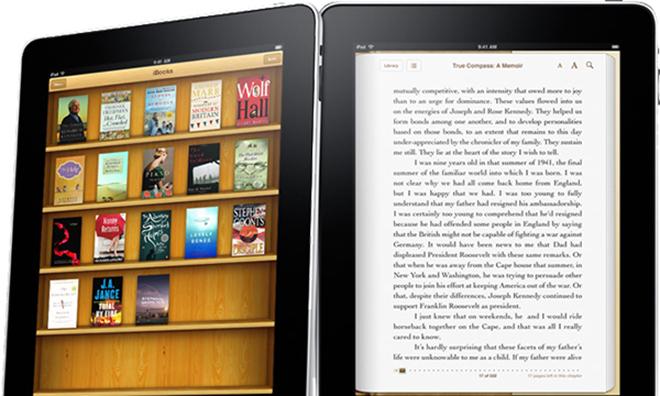Today the U.S. Justice Department will take Apple to court over allegations that the computer maker illegally conspired with publishers to fix the prices of electronic books, in order to sell them to users of its iPad and other iOS devices at a higher cost.
Apple is the last defendant in the price-fixing case, as the other publishers have agreed to settlements with the Justice Department in recent months. Apple, the government claims, knowingly engaged in a conspiracy with Macmillan, Simon & Schuster, Hachette Book Group, Pearson, and HarperCollins in order to set prices above the $10 norm that Amazon was charging for e-books.
A lawyer with Patton Boggs told Bloomberg it is "pretty unusual" to see a case like this go to trial — likely due to the tendency for defendants, even tech giants, to settle. Observers note that it is indicative of a larger trend that has seen the Obama administration's Justice Department more vigorously pursuing antitrust actions against companies.
Should the government win the case, Apple would likely be barred from certain anticompetitive actions, including price fixing, in the ebook market.
Apple holds that it acted on its own, negotiating contracts with each individual publisher to establish an "agency" model. Under that model, publishers set prices for books instead of the retailers. Apple, under that model, receives 30 percent of the price for each book.
Apple says that, prior to its entry into the ebook market with the 2010 introduction of the iPad and the iBookstore, nine out of 10 ebooks bought by consumers were purchased through Amazon. Publishers are said to have been unhappy with the low $10 price the online retailer was set on charging for their products, even though Amazon was actually paying more money to the publishers than it was charging customers for the books.
According to Apple, its entry into the ebook market gave consumers more choices, better e-readers, and lower overall prices. CEO Tim Cook has been ardent in his defense of the company.
"The ebook case to me is bizarre," Cook said last week at AllThingsD's D11 conference. "We've done nothing wrong there and so we're taking a very principled position on this... And so we're going to fight."
The trial will proceed without a jury, with U.S. District Judge Denise Cote presiding. Cote's pre-trial comments may give Apple pause, though, as she previously said that the government likely has enough evidence to show a knowing conspiracy on Apple's part.
Among the evidence the Justice Department will produce are emails from late Apple cofounder Steve Jobs, as well as testimony from Eddy Cue, the Apple executive most involved with the negotiations with publishers. Jobs' email may be among the DOJ's most damning pieces of evidence, as it asks the publishers to "Throw in with Apple" at a price floor of $13 "and see if we can all make a go of this."
Lawyers for Apple and the Justice Department will give their opening statements on Monday in a Manhattan federal court.
 AppleInsider Staff
AppleInsider Staff







-m.jpg)






 Charles Martin
Charles Martin

 Malcolm Owen
Malcolm Owen
 William Gallagher
William Gallagher

 Christine McKee
Christine McKee
 Wesley Hilliard
Wesley Hilliard









41 Comments
With luck the first thing Apple will do is request a new judge, as this one has already decided the case before it starts. Or if there is a chance of appeal, perhaps they won't and will hold it as an issue to file appeal.
[quote name="charlituna" url="/t/157817/apple-heads-to-court-in-unusual-antitrust-trial-over-e-book-prices#post_2337356"]With luck the first thing Apple will do is request a new judge, as this one has already decided the case before it starts. Or if there is a chance of appeal, perhaps they won't and will hold it as an issue to file appeal.[/quote] I think that's not going to happen as I don't see how the judge stated the outcome ahead of time. At worse it just seems like poor form, but that may only because I've never heard a judge commenting publicly on a case before the final verdict. She said what she thinks is likely, but in no way said Apple is guilty. Based on the evidence I've read I'm saying that I think Apple will be found [I]not[/I] guilty, but if actual collusion evidence comes up I won't hesitate to change what I think the most likely result will be.
I think this will be the first time ever that a company goes to trial over anticompetition allegations when said company does not only not have a monopoly, but is competing against a company that does. I really don't like wearing tinfoil hats but this just reeks of lobbying by Amazon.
With luck the first thing Apple will do is request a new judge, as this one has already decided the case before it starts.
Or if there is a chance of appeal, perhaps they won't and will hold it as an issue to file appeal.
I think the reason for the comments made by the judge is actually good for Apple. To me it's a last attempt to get Apple to settle out of court by "indicating" they will lose. Apple is not biting on this one .... good on them. At worst, if Apple loses... (they won't) ... there are the grounds for an appeal.
[quote name="newbee" url="/t/157817/apple-heads-to-court-in-unusual-antitrust-trial-over-e-book-prices#post_2337370"]To me it's a last attempt to get Apple to settle out of court by "indicating" they will lose.[/quote] I like that that theory.